Text
Lecture: Bataille and the Politics of the Animal
On February 22, I will give on of the keynote lectures for the three-day conference on Georges Bataille held in the context of the annual Kolloquium Junge Religionsphilosophie in Berlin. My talk will discuss whether the elements for a politics of the animal may be found in Bataille's postwar writings, focusing in particular on his studies of the Lascaux cave paintings, his theory of religion, and his essay "Friendship Between Man and Beast." More information on the conference can be found on www.katholische-akademie-berlin.de .
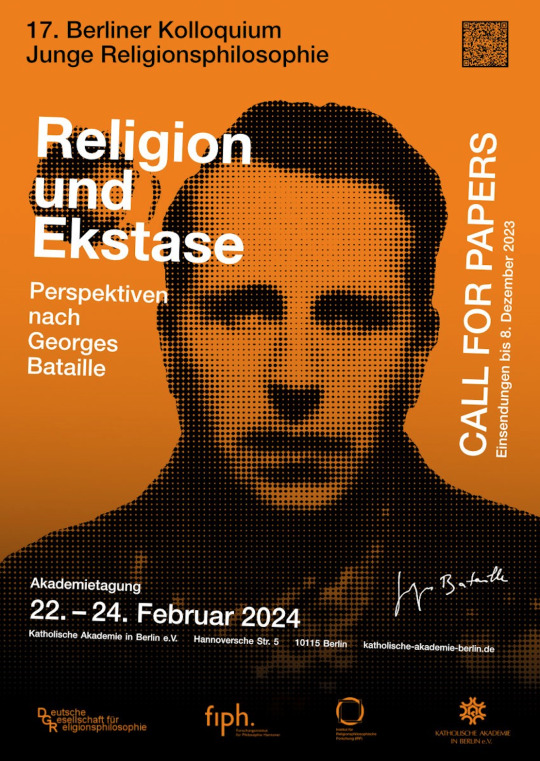
0 notes
Text
Politicization of Nature: Luxemburg, Kraus, Benjamin
Out now in the latest issue of Modern Language Notes (MLN): my article on Rosa Luxemburg's encounter with a wounded buffalo, employed as a beast of burden and beaten by a soldier on the courtyard of the Breslau prison. The article discusses Luxemburg's description of this encounter in a letter to Sophie Liebknecht through the lense of subsequent comments on the letter by Karl Kraus and Walter Benjamin. In their readings, Luxemburg's striking reference to the buffalo as a "brother" is transformed into the image of a coming politics, involving the claim to a liberation that involves not only humans beings but the "entirety of creation" (Benjamin) – a claim that Kraus renders as the call for a "republic of buffaloes."
The article is supplemented by the first English translation of Kraus' commentary on Luxemburg's letter and its defense against the attacks of an anonymous landowner who, in an open letter, ridiculed the "sentimentality" of her description of the encounter with a beats of burden.
The article can be accessed via Project Muse: https://muse.jhu.edu/pub/1/article/917912/pdf – if you're interested in the article but don't have access, feel free to send me an email.
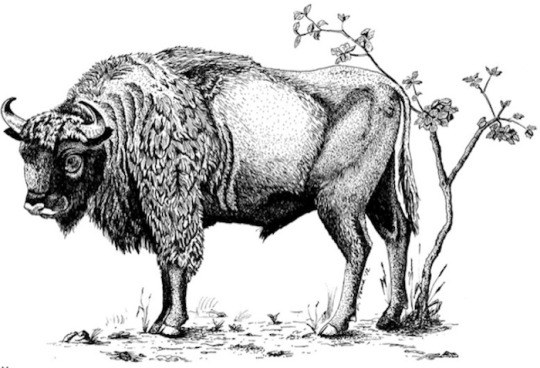
0 notes
Text
Lecture: Revolution und Gnade
On October 27 I will give a lecture on Simone Weil’s early philosophical writings as part of the “Revolution und Gnade” conference – a long overdue event focusing entirely on Simone Weil’s political thought. The conference will be held on October 26-27, is co-hosted by the Zentrum für Literaturwissenschaft (ZfL) in Berlin and the Institut für Philosophie of the Freie Universität (FU) Berlin, and organised by Anne Eusterschulte, Oliver Precht and Elena Stingl.
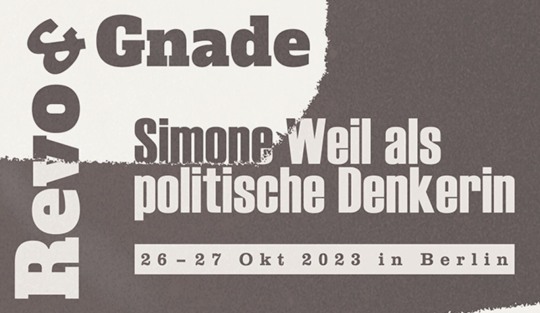
0 notes
Text
Out now: Continuity as Catastrophe
My article “Continuity as Catastrophe: Origins of a Thesis in Walter Benjamin” is out now with New German Critique. The article has been made available freely; it can be read online and downloaded as a PDF here:
read.dukeupress.edu/new-german-critique/article/50/1%20(148)/59/343740/Continuity-as-Catastrophe
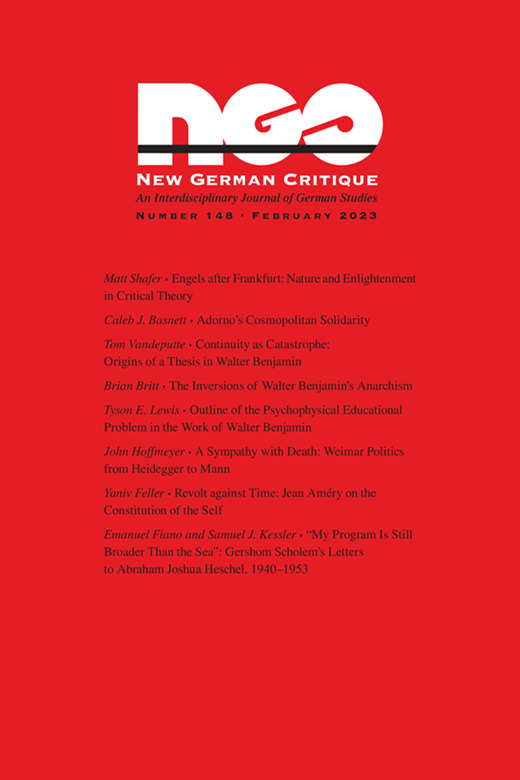
0 notes
Text
Writing at the End
My article ‘Writing at the End’, on Benjamin’s reading of Karl Kraus’ apocalyptics, will be published in a special issue of Monatshefte on Benjamin’s journalistic networks, edited by Carolin Düttlinger (Oxford) and Daniel Weidner (Halle). The article draws on and expands some of the arguments developed in my book Critique of Journalistic Reason (Fordham, 2020).
0 notes
Text
Keynote: Simone Weil’s Late Political Thought
On February 25, I’ll give one of the keynote speeches for the conference “Der abwesende Gott: Simone Weil und die Folgen,” the 16th edition of the Berliner Kolloquium Junge Religionsphilosophie. The talk, which draws on my book-in-progress on Weil’s political thought, will address the interplay between the political and the religious in Weil’s late text “Are We Struggling for Justice?”

For more information on the event and the call for papers, see the conference website.
0 notes
Text
Günther Anders: Nuclear Theology
From this year onwards, my philosophy seminars at the Sandberg Institute will be open to the public. Organised around the theme of “Philosophy and Apocalypse,” this year’s seminar programme will focus on different philosophical engagements with the idea of the end of the world. We kick off with the programme with a series of three seminars on Günther Anders.
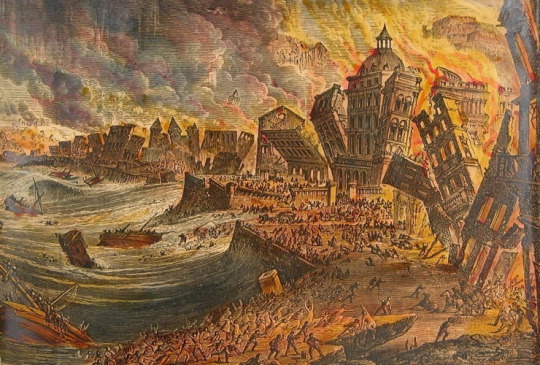
Günther Anders: Nuclear Theology
Winter 2022-23
The first series of this year's philosophy seminars will focus on the work of the Austrian-Jewish philosopher Günther Anders and his concept of a “nuclear theology.” Over the course of three meetings, we will discuss Anders’ account of the implications of the invention of the atomic bomb and the human species’ expanding power of destruction and, at its limit, self-annihilation. A selection of Anders’ essays on the end of time, “nuclear theology” and what he calls an “apocalypse without kingdom” will be read alongside contemporary reflections on nuclear disaster by the philosopher Sabu Kohso and poet Ryoko Sekiguchi.
Seminar dates: Friday November 18, December 2, January 13 (14.00-16.30)
To sign up and receive readings for the seminars, please email [email protected]
0 notes
Text
IWBS Conference: Law, Justice and Politics
For the upcoming biannual conference of the International Walter Benjamin Society (IWBS) I’ll co-chair one of the seven conference sections with Hannah Franzki. The Call for Proposals for our section, titled “Law, Justice and Politics" is included below; for more information on the conference and submission guidelines, see the IWBS website.
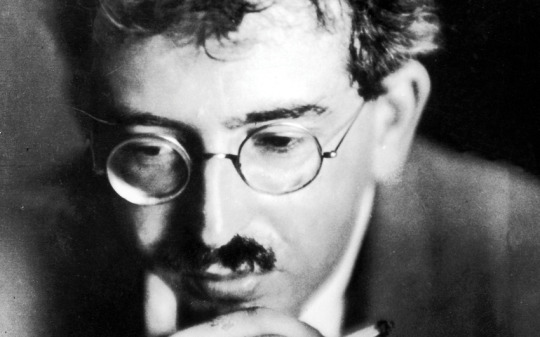
Law, Justice and Politics
Chairs: Hannah Franzki & Tom Vandeputte
The concept of justice is widely acknowledged to play a crucial role in Benjamin’s political thought. Before his political writings of the early 1920s, most famously “Toward the Critique of Violence,” it already appears in a variety of other texts and fragments which often remained unpublished during his lifetime. Also in his later writings, the term continues to surface in his engagement with political-philosophical problems – for instance in the 1931 essay on Karl Kraus, where Benjamin ties his reflections on justice both to the Jewish tradition and to the critique of right of the young Marx. A constant in Benjamin’s work on the category of justice is, indeed, its relation not only to the critique of law and the State, which can already be traced back to his fragments of 1916, but also to the critique of capitalism (most prominently, perhaps, in the fragment on “Capitalism as Religion”). What seems to hold the two together is a theory of fate and its “basic concept”: Schuld, guilt or debt, with its specific moral, economic and temporal logic.
In this section, we wish to examine the place of the category of justice in the different strands of Benjamin’s political thought, including his comments on law. Beyond “Toward Critique of Violence,” which has received extensive scholarly attention, we are especially interested in exploring the account of justice in other texts and contexts. We hope to discuss, amongst others, the role of politics and the political in Benjamin’s thinking on justice; the political implications of Benjamin’s work on judgement and the idea of Rechtsprechung ohne Urteil; the place of the category of justice in the different variations of the critique of law; and the relation of justice to the critique of capitalism. Contributions may engage with these (or related) topics in order to shed light on philosophical and/or contemporary political problems.
0 notes
Text
Visiting Fellowship at University of Cambridge

Excited to start a visiting fellowship at the University of Cambridge, where I’ll be hosted by the Centre for Research in the Arts, Social Sciences and Humanities (CRASSH). The project I’ll work on in Cambridge, titled “Planetary Futures", is part of a book-in-progress on Benjamin's political thought and focuses on his account of the "planetary" as a philosophical and political category.
0 notes
Text
Special Issue: Diacritics
Together with Rachel Aumiller, Sam Dolbear and Paul Fleming I am editing a special issue of Diacritics. The issue will focus entirely on Benjamin’s “Fate and Character,” a brief essay from 1919 that anticipates many of the concerns of his major work of political theory, “Toward the Critique of Violence.”
0 notes
Text
Seminar Series: Horkheimer’s “Twilight”
This term, my seminars in philosophy and critical theory at the Sandberg Institute focus on Max Horkheimer’s early bundle of aphorisms, “Twilight” (Dämmerung). Due to the Covid restrictions, no additional places are available for this seminar; to participate in the seminar series of the spring term, on Simone Weil’s political thought, please email me on tom.vandeputte (at) sandberg.nl .
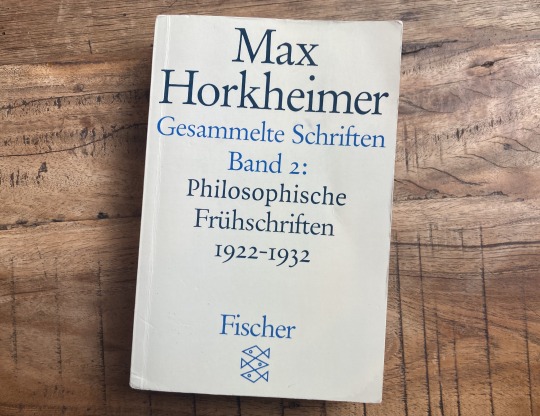
0 notes
Text
Talk at GSA Annual Conference
On October 1 I will give a talk as part of the "Justice of Language" panel series organised by Christy Frey, David Martyn and Jeffrey Librett at the GSA 2021 conference. My paper discusses the nexus between Benjamin's critique of law and his theory of justice, focusing on his citation of Goethe's phrase "you let the poor become guilty" (ihr lasst den Armen schuldig werden).
0 notes
Text
Talk at Zentrum für Literatur- und Kulturforschung
On July 15, I will present and discuss a paper on Benjamin's critique of law, guilt and the criminalisation of poverty at this three-day workshop at the Leibniz-Zentrum für Literatur- und Kulturforschung, Berlin, organised by Alexis Alvarez, Hannah Franzki and Rafael Vieira: www.zfl-berlin.org/veranstaltungen-detail/items/working-with-benjamin-on-law.html
0 notes
Text
Forthcoming article in New German Critique
I’m happy to announce that my article “Continuity as Catastrophe: Origins of a Thesis in Walter Benjamin” has been accepted for publication in New German Critique. An abstract of the article, which focuses on Benjamin’s famous claim that the simple fact that “things go on like this is the catastrophe,” is included below.
Continuity as Catastrophe: Origins of a Thesis in Walter Benjamin
In an unpublished fragment from the late 1930s, Walter Benjamin famously calls for a recasting of the idea of catastrophe and its relation to the progression of history. Catastrophe, Benjamin contends here, is not to be understood as an exception to the regular course of history; rather than being conceived as a singular event marking the end of the world in its given form, catastrophe is to be located in its persistent continuity – the simple fact that “things go on like this.” This essay traces the origins of this thesis to an earlier text: a 1923 manuscript that Benjamin wrote during a journey through Germany at the peak of the hyperinflation. Examining this text in relation to a treatise that was of particular significance to Benjamin – Erich Unger’s 1921 Politics and Metaphysics – I offer a reconstruction of the image of catastrophic history presented here as well as its significance for Benjamin’s emerging political thought of the early 1920s. Through a commentary on both texts, I seek to contribute to a better understanding of the sources and meaning of the “continuity as catastrophe” thesis, sketching out how Benjamin’s singular vantage point could inform contemporary debates on catastrophe, apocalypse, and the politics of interruption.
0 notes
Text
Benjamin’s Politics: Workshop
On May 14-15 I am co-organising a workshop on Walter Benjamin’s concept of politics, which is the latest instalment in our ongoing workshop series on philosophical concepts in Benjamin. For this workshop, which is hosted by King’s College London, we will be joined by Pablo Oyarzún Robles as well as Agata Bielik-Robson and Irving Wohlfarth.
The workshop description:
Like many of his other endeavours, Walter Benjamin’s reflections on the concept of politics have a fragmentary character. In the late 1910s and early 1920s, he worked intensively on a project that he came to refer to simply as his Politics; but even though this study appears to have been largely completed, most of the resulting texts have been lost or survived only in the form of outlines, notes, drafts, and fragments. Despite this fragmentariness, the traces of this project contain numerous clues as to the central themes and problems at the heart of Benjamin’s political thought. These range from his critique of law and notes on the “category of justice” to a theory of “ethical anarchism”; and from his reflections on the nexus of politics and world history to a new conception of the human being qua political being. All of this, finally, marks Benjamin’s investment in political practice.
This two-day virtual workshop focusses on the fragments and studies written in the orbit of Benjamin’s seminal essay “Towards the Critique of Violence,” stemming mainly from the period between 1918 and 1921. The workshop will be organised around collective readings and discussions of selected text passages, each introduced by a brief presentation. The constellation of problems and concepts presented in these texts will serve as a starting point for a broader exploration of Benjamin’s political thought: we will ask what it means to read these texts today – and how we might understand their actuality.
0 notes
Text
Centre for Continental Thought Amsterdam
We're happy to announce the launch of the Centre for Continental Thought (CCT), a new Amsterdam-based platform for scholars whose work engages with the continental philosophical tradition. The centre will be jointly hosted by the Sandberg Instituut and the University of Amsterdam. For more information, please contact me and co-founder Joost de Bloois at centreforcontinentalthought [at] gmail.com.
0 notes
Text
Interview for Journal of the History of Ideas
I was interviewed by Jonathon Catlin about my book Critique of Journalistic Reason (Fordham, 2020) for the blog of the Journal of the History of Ideas. The full interview can be read here: https://jhiblog.org/2020/11/11/philosophy-in-the-time-of-the-newspaper-an-interview-with-tom-vandeputte/
0 notes